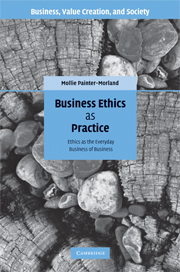Book contents
- Frontmatter
- Contents
- List of tables
- Preface
- Foreword
- Acknowledgements
- 1 Introduction: the dissociation of ethics from practice
- 2 Reconsidering approaches to moral reasoning
- 3 Moral agency reconsidered
- 4 Reconsidering values
- 5 Leadership and accountability
- 6 Reconsidering ethics management
- Index
- References
3 - Moral agency reconsidered
Published online by Cambridge University Press: 22 September 2009
- Frontmatter
- Contents
- List of tables
- Preface
- Foreword
- Acknowledgements
- 1 Introduction: the dissociation of ethics from practice
- 2 Reconsidering approaches to moral reasoning
- 3 Moral agency reconsidered
- 4 Reconsidering values
- 5 Leadership and accountability
- 6 Reconsidering ethics management
- Index
- References
Summary
It is not uncommon for business ethics practitioners to encounter skepticism when they make proposals aimed at improving the commitment of an organization's employees to ethical behavior. In my experience as corporate consultant, I have come across some corporate executives who argue that ethics is a case of “motherhood and apple pie” and that there is really very little that can be done to influence people's ethical behavior at work. They insist that those individuals who act unethically represent no more than a few “rotten apples” who need to be removed. From their perspective, enforcing company rules and dismissing those who transgress the law, is the best strategy for managing ethical risks in the workplace.
However, events at the beginning of the twenty-first century have made this sort of attitude seem untenable and irresponsible. In the post-Enron world, there is a great deal of concern about the way in which corporate agents fulfill, or fail to fulfill, their fiduciary duties. The checks and balances that professionals and governance structures were supposed to provide have proved unreliable and have eroded the public's trust. Discipline and legal penalties no longer seem to provide sufficient safeguards against those who would behave unethically. Firing, fining or imprisoning transgressors provides little consolation to those who have been affected. Under these conditions, the argument that ethics is a case of “motherhood and apple pie” seems little more than a convenient ruse to allow business organizations to shirk their responsibility for the unethical behavior of their agents.
- Type
- Chapter
- Information
- Business Ethics as PracticeEthics as the Everyday Business of Business, pp. 94 - 129Publisher: Cambridge University PressPrint publication year: 2008
References
- 1
- Cited by

